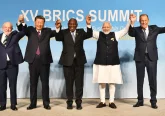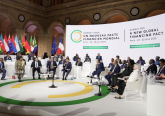Today Algeria is heading for the ballot box. Algeria experts Mehdi Lazar and Sidi-Mohammed Nehad explain why today’s elections could be of central importance for Algeria’s political future.
Since the partitioning of the Sudan, Algeria is the largest African country and a primary regional power in the Mediterranean region. Therefore, the condition of this North African pivot-state is essential for Europe: Algiers is the 3rd largest energy supplier to the EU, while its population of 38 million inhabitants, its anti-terrorism security expertise and the size of its armed forces (130,000 men) make their security capabilities necessary to the stability of the Sahel zone. Moreover, with a gross domestic product (GDP) of 208 million dollars in 2013, Algeria remains the largest regional economy. Algiers was the least affected by the wave of the Arab Spring despite negative societal indicators. This situation contrasts with that of Tunisia or Egypt, notably due to politics of large redistribution of riches gained from oil revenues, but also due to the people’s fear of a return to a decade of stagnation.
Nevertheless, the relative calm in this country during the last three years should not lead one to believe that the upcoming presidential election is not without high stakes. In fact, the trajectory of this powerful regional presence is uncertain for at least two reasons. First, the country’s socio-economic dynamic is worrisome. Second, the security dynamic is deteriorating given that Jihadist groups have found new resources. Thus, in the context of a tense regional framework, the Algerian situation is more important today than ever before.
Economic uncertainy
Algeria’s economic situation has not yet reached its potential. The country’s economy remains minimally diversified, with a pronounced trend towards deindustrialization and endemic corruption. Moreover, in the event of non-exploitation of unconventional hydrocarbon resources, the growing population and the increased demand for gas will become more incompatible with the necessary exports of hydrocarbons from the country. This is mainly due to an emphasis on short term revenue over long term management of gas resources.
Additionally, Algeria has not managed to avoid an economic gridlock, with 21% of its youth (70% of the overal population) unemployed, despite state expenditure rising with 25% since the beginning of the Arab revolutions. Increasing riots, mostly in the rural regions, seem to exacerbate a social crisis whose fundamental causes stretch back as far as the 1988 October riots. So, when the NLF party of President Abdelaziz Bouteflika recently announced that he would seek a fourth term in office, many voices in Algeria took the occasion to denounce the impasse in which the country finds itself. The Barakat movement, which calls for opposition to these elections, forms a good case in point.
Besides the fact that the presidential candidate doesn’t seem to be in a state to govern, little major reforms have been enacted these last 20 years in order to diversify an economy which remains highly dependent upon hydrocarbons. The rapidly dwindling exchange reserves since 2011 and the lack of vision with regard to energy policy these last several years make one greatly fear a return to the gas and oil circumstances that landed Algeria in great difficulty.
A precarious social order
This hypothesis regarding the destabilization of Algeria in the context of North African security is therefore of great concern. Since 2011, the shockwave of Arab Springs has rattled many countries and has reduced the Sahel zone to chaos. In particular, the 2012 assassination of the US Libyan Ambassador Christopher Stevens, then the French intervention in Northern Mali and the spectacular attack by a branch of the Al-Qaeda in the Islamic Maghreb (AQIM) on the In Amenas oil terminals in 2013—with calamitous crisis management by the Algerian authorities—have proven the zone’s fragility.
What is more, the In Amenas attack illustrates the transformation of armed Islamist groups in the Maghreb and their increasing capacity to target the principal hydrocarbon production installations within the country. Of course, in response Algeria is participating in attempts to create and improve regional security capacities, like the CRIC (which excludes Morocco due to a conflict surrounding the question of the western Sahara) but in fact Algiers is having trouble really cooperating with its neighbors—notably due to the latent “Cold War” with Morocco. Plus, it seems that Algiers has engaged in the formation of these structures in order to dissuade any foreign intervention in North Africa. This appears to be quite insufficient in face of a Jihadist situation that is deteriorating in the Sahel with a phenomenon of reorganization and internationalization of armed Islamist groups.
Politics at a crossroads
Caught between the dynamic of the Arab Springs and that of the destabilization of the Sahel, the Algerian trajectory remains uncertain. Since its stability is essential for Europe, the stakes of the April presidential elections are high. The three geopolitical ‘sources of revenue’ on which Algeria relies for its international influence and relative social stability —hydrocarbon, security, and (the threat of) civil war — might no longer prove sufficient if today’s elections fail to bring political change. For without this, economic reform, increased regional cooperation and jobs for the country’s youths, will most likely fail to materialise too.
Unfortunately, the confrontations among intermediary groups since the beginning of the campaign do not permit one to predict the outcome. In this case, Algeria remains an idol with feet of clay capable of collapsing and bringing down with it the security of North Africa as well as a large part of the European energy supply.








1 Comment